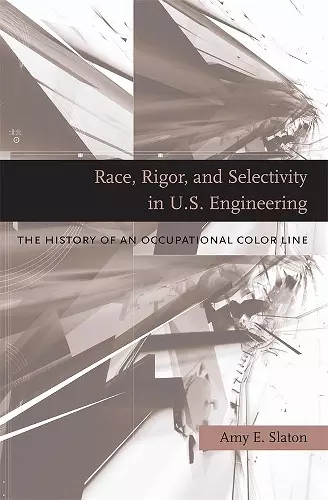Race, Rigor, and Selectivity in U.S. Engineering
The History of an Occupational Color Line
Format:Hardback
Publisher:Harvard University Press
Published:17th Mar '10
Currently unavailable, and unfortunately no date known when it will be back

Race, Rigor and Selectivity is an important contribution to understanding the historical institutional and individual challenges in attracting, retaining, and advancing underrepresented minority students in engineering disciplines. Most significantly, she recognizes that many of the thorniest challenges are with the institutions that students would enter and not with the students themselves. Slaton offers common sense observations and practical suggestions for how the engineering community through diversification might add vitality to the profession, and better serve its creed of working for "the advancement and betterment of human welfare." -- Dr. Norman L. Fortenberry, Director, Center for the Advancement of Scholarship on Engineering Education National Academy of Engineering In compelling fashion Amy Slaton reframes the entire debate about public policy related to diversity and under-represented groups in science and engineering programs. -- Bruce Seely, Department Chair and Professor of History, Michigan Technological University
Focusing on engineering programs in three settings—Maryland, Illinois, and Texas, from the 1940s through the 1990s—Slaton examines efforts to expand black opportunities in engineering as well as obstacles to those reforms. She exposes the negative impact of conservative ideologies in engineering, and of specific institutional processes.
Despite the educational and professional advances made by minorities in recent decades, African Americans remain woefully underrepresented in the fields of science, technology, mathematics, and engineering. Even at its peak, in 2000, African American representation in engineering careers reached only 5.7 percent, while blacks made up 15 percent of the U.S. population. Some forty-five years after the Civil Rights Act sought to eliminate racial differences in education and employment, what do we make of an occupational pattern that perpetually follows the lines of race?
Race, Rigor, and Selectivity in U.S. Engineering pursues this question and its ramifications through historical case studies. Focusing on engineering programs in three settings—in Maryland, Illinois, and Texas, from the 1940s through the 1990s—Amy E. Slaton examines efforts to expand black opportunities in engineering as well as obstacles to those reforms. Her study reveals aspects of admissions criteria and curricular emphases that work against proportionate black involvement in many engineering programs. Slaton exposes the negative impact of conservative ideologies in engineering, and of specific institutional processes—ideas and practices that are as limiting for the field of engineering as they are for the goal of greater racial parity in the profession.
Race, Rigor, and Selectivity in U.S. Engineering is an important contribution to understanding the historical institutional and individual challenges in attracting, retaining, and advancing underrepresented minority students in engineering disciplines. Most significantly, [Slaton] recognizes that many of the thorniest challenges are with the institutions that students would enter and not with the students themselves. Slaton offers common sense observations and practical suggestions for how the engineering community through diversification might add vitality to the profession, and better serve its creed of working for ‘the advancement and betterment of human welfare.’ -- Dr. Norman L. Fortenberry, Director, Center for the Advancement of Scholarship on Engineering Education, National Academy of Engineering
In compelling fashion, Amy Slaton reframes the entire debate about public policy related to diversity and under-represented groups in science and engineering programs. -- Bruce Seely, Department Chair and Professor of History, Michigan Technological University
- Nominated for Don K. Price Award 2010
- Nominated for Rachel Carson Prize 2010
- Nominated for Pfizer Award 2012
- Nominated for Sally Hacker Prize 2012
- Nominated for Ludwik Fleck Prize 2012
ISBN: 9780674036192
Dimensions: unknown
Weight: unknown
298 pages